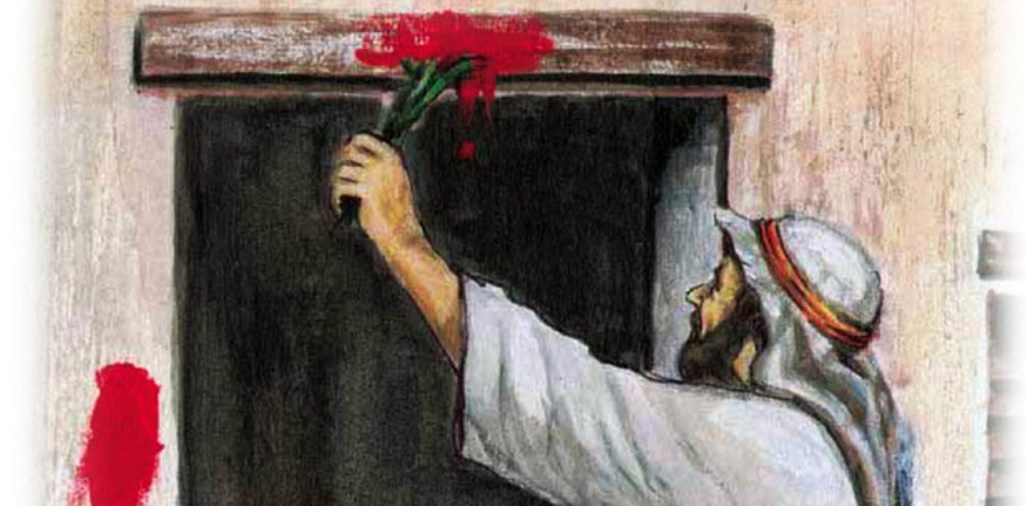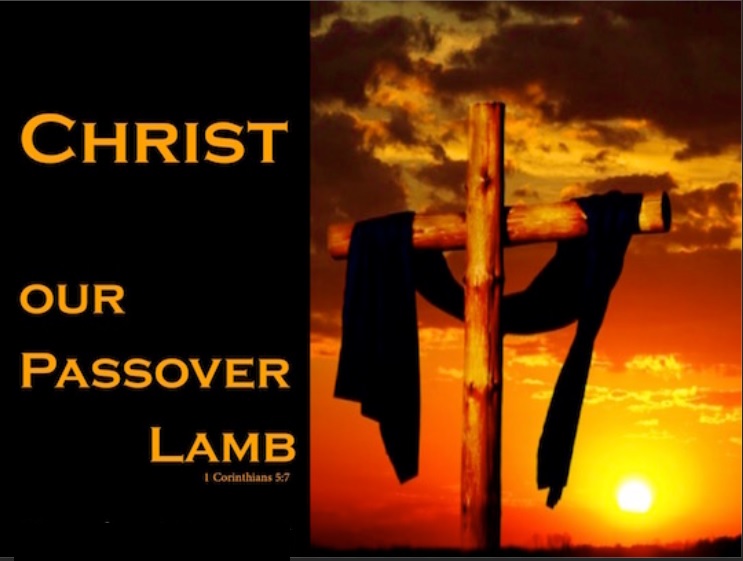“Go therefore and make disciples of all the nations…teaching them to observe all that I commanded you; and lo, I am with you always, even to the end of the age” (Matthew 28:19-20, NASB).
——————–
Contents:
1) The Prophet of the Passover (Andy Diestelkamp)
2) Jesus Christ — The Lamb of God (Tom Edwards)
3) What To Do When the Country Is Falling Apart (Gardner Hall)
4) News & Notes
——————–

-1-
The Prophet of the Passover
Andy Diestelkamp
By the time the generation of Joseph and his brothers passed away, “the children of Israel … multiplied and grew exceedingly mighty; and the land [of Egypt] was filled with them” (Ex. 1:7). Not wanting to lose them as a labor force but not wanting them to increase in power, the Egyptians “set taskmasters over them to afflict them with their burdens” (v. 11). However, despite life being hard for the Israelites, they continued to multiply to the point that Pharaoh instructed all newborn males to be killed (vv. 12-22).
It is in this context that Moses was born to parents of the tribe of Levi, who—“by faith” and “not afraid of the king’s command”—hid him for three months (Heb. 11:23). Then he was adopted by Pharaoh’s daughter with his own mother serving as nursemaid (Ex. 2:1-10). No wonder then that Moses, despite being “learned in all the wisdom of the Egyptians” (Ac. 7:22), had such an affinity for his Hebrew brethren when he “looked at their burdens” (Ex. 2:11) that he came to their defense. This he did by faith, “choosing rather to suffer affliction with the people of God than to enjoy the passing pleasures of sin” (Heb. 11:24-25). As Stephen noted, Moses “supposed that his brethren would have understood that God would deliver them by his hand, but they did not understand” (Ac. 7:25). So Moses fled into the wilderness of Midian and worked as a shepherd there for forty years (v. 30) before God called Him to return to Egypt to appear before Pharaoh “that you may bring My people, the children of Israel, out of Egypt” (Ex. 3:10).
The parallels between Moses and Jesus are obvious. From events surrounding their births (fearful king killing innocent baby boys) to coming to deliver others from bondage to being rejected, Moses pointed to Jesus. Years later, Moses told the children of Israel that one day God would “raise up for you a Prophet like me from your midst, from your brethren. Him you shall hear” (Deut. 18:15).
Stephen, in his own defense before an angry Jewish council, established Israel’s pattern of rejecting God’s prophets, citing the rejections of both Joseph and Moses by the Jewish forefathers (Ac. 7:9-36). Speaking of Moses, Stephen said, “whom our fathers would not obey, but rejected. And in their hearts they turned back to Egypt” (7:39). This history he reviewed as evidence that the Jews’ rejection, betrayal, and murder of the Messiah was just more of the same (vv. 51-53). “Anyone who has rejected Moses’ law dies without mercy … of how much worse punishment … will he be thought worthy who has trampled the Son of God underfoot, counted the blood of the covenant by which he was sanctified a common thing, and insulted the spirit of grace?” (Heb. 10:28-29).
Moses was to secure the deliverance of the children of Israel from their bondage in Egypt through a series of plagues by which Egypt would be humbled, God would be glorified, and the so-called gods of the Egyptians shown to be impotent (Ex. 3:20; 7:3-5; 12:12 ). Most of the ten plagues could have been seen as direct attacks on objects of Egyptian worship. After nine plagues, God told Moses, “I will bring yet one more plague on Pharaoh and on Egypt. Afterward he will let you go from here. When he lets you go, he will surely drive you out of here altogether” (11:1). Moses predicted to Pharaoh that “all the firstborn in the land of Egypt shall die” (v. 5). Then Moses “went out from Pharaoh in great anger” (v. 8). But God told Moses, “Pharaoh will not heed you, so that my wonders may be multiplied in the land of Egypt” (v. 9). Yet, this would be the event that would secure the deliverance of Israel from bondage.
God told Moses to instruct the children of Israel about what He was going to do and how to prepare for the event. In view of their coming deliverance, the current month would be the first month of Israel’s calendar (12:1). On the tenth day of the month, each household was to select a lamb (v. 2) “without blemish, a male of the first year” (v. 5). It was to be kept until the fourteenth day and then killed at twilight with its blood being applied to the doorposts and lintel of the house in which the lamb was to be eaten (vv. 6,7). The meal was to be eaten quickly as they prepared for travel and was called, “The LORD’s Passover” (v. 11).
The significance of this terminology pertained to the judgment coming upon Egypt from which Israel would be spared. “For I will pass through the land of Egypt … and will strike all the firstborn … both man and beast; and against all the gods of Egypt I will execute judgment. I am the LORD” (v. 12). The blood would be the sign that would “make a difference between the Egyptians and Israel” (11:7). God said, “When I see the blood, I will pass over you; and the plague shall not be on you to destroy you when I strike the land of Egypt” (12:13). Moses assured the people that God would “not allow the destroyer to come into [their] houses” (v. 23). On the midnight following the fourteenth day of the month, God struck all the firstborn in Egypt. Pharaoh rose in the night, called for Moses with the message, “go out from among my people, both you and the children of Israel. And go serve the LORD as you have said” (vv. 29-31). The blood of an unblemished lamb saved believers from the wrath of God and secured their freedom from bondage. They were to remember this for generations to come (vv. 24-27). So should we!
— Via Think On These Things, Volume 51, No. 4, October-November-December 2020
——————–

-2-
Jesus Christ — The Lamb of God
Tom Edwards
As we think about the previous, excellent article by Andy Diestelkamp on “The Prophet of the Passover,” and especially in reading the part that “The blood of an unblemished lamb saved believers from the wrath of God and secured their freedom from bondage,” how could we not also think of Jesus Christ whom John the Baptist refers to as “the Lamb of God who takes away the sin of the world” (John 1:29)!
For because of the offering Jesus made of His own body on the cross, His death brought about the only atonement that can blot out sin (cf. Heb. 10:4; 1 Pet. 1:18-19) and save us from the wrath to come! How needful that was — and is!
In spite of the terrible agony in facing and undergoing the preliminary, near-unto-death scourging and the constantly intense torment of crucifixion (Matt. 26:38; Luke 22:44; Matt. 27:26), Jesus had offered Himself freely, willingly, of His own initiative (John 10:17-18) for every sinner of all time (Heb. 2:9; 1 John 2:2).
But just as Israel of old had to meet God’s conditions, such as in putting the blood of the Passover lamb on the doorposts and lintels of their houses (Exodus 12:7), even so we must meet the Lord’s conditions in this Gospel Age so that the blood of Christ, His atoning death, can be applied to our lives to save us from our sins and from the eternal consequences of them. For Jesus is “our Passover” (1 Cor. 5:7).
How wonderful it is that “God so loved the world, that He gave His only begotten Son” (John 3:16); and that “while we were yet sinners, Christ died for us” (Rom. 5:8) to make redemption possible (1 Pet. 1:18-19; 1 Cor. 6:20; Acts 20:28).
You might turn down many good opportunities as you go through life, but if you are one who continues to reject God’s love and the atonement Jesus made for you, it will be your greatest regret in the Judgment Day.
So if you are in need of the salvation the Lord offers you — and very much wants you to have — why not humbly and gratefully accept it this very day (as shown in the necessary steps near the end of this bulletin)!
What could be more important than being forgiven of your every sin, becoming a child of God, having the hope of everlasting life, and one day entering into that glorious place called heaven to enjoy its bliss forevermore!
Nothing else in this world can even come close to the greatness of that — and Jesus Christ became the Lamb of God to make that attainable for all who will submit to His Gospel plan of salvation.
——————–

-3-
What To Do When the Country Is Falling Apart
Gardner Hall
The prophet Habakkuk was overwhelmed with anxiety about two things: (1) The injustice in his country (1:1-4) and (2) the resulting destruction at the hands of the Babylonians (1:5-2:1). However, when the prophet turned to the Lord in prayer, his confidence grew to the point that he could rejoice in the Lord whatever happened (3:17-28). The final verse of the book, a statement from one of David’s Psalms (18:33), is compelling. “Yahweh my Lord is my strength; He makes my feet like those of a deer and enables me to walk on mountain heights!” (HCSB).
The reference is probably to an animal like the Palestine mountain gazelle. Their hoofs have sharp edges and the undersides are concave, enabling them to climb seemingly impassible cliffs and thus view the world, as it were, from above the fray. That’s the idea here! God gave the prophet feet like those of a deer, the spiritual traction to climb into the spiritual realms and view the rise and fall of the nations with a compliant detachment.
God’s followers today are often overwhelmed with the same type of anxiety: (1) The injustices in our countries and (2) their growing weakness. Rather than wanting us to fall into depression when being bombarded with news about the evils in our nation, God invites us through the prophet to pray to him and rise above the fray into the heavenly realms. A focus on him and eternity helps us avoid the despair that comes from a this-worldly focus. “Yahweh my Lord is my strength; He makes my feet like those of a deer and enables me to walk on mountain heights!” (Idea from my dad, Sewell Hall.)
— Via Search for Truth, Volume XIII, Number 16, November 16, 2020
——————–
-4-
News & Notes
Folks to be praying for:
Chris Williams (Cheryl Corbitt’s son-in-law) had a minor heart attack Friday at just 28 years of age. He is now back home and wanting to return to work, but is to take it easy for a while.
Anita Young continues to heal from her recent fall and does not have much pain now. But she is to still keep weight off her leg for a few more weeks with the use of a wheelchair and a crutch. Her previous foot problem, which she had an injection for, continues to be okay.
Elizabeth Harden (Anita Young’s daughter) is doing well, along with her unborn. Her due date has been moved from December 30 to January 4.
Being over her covid-19, Rachel Gerbing will be resuming her job tomorrow.
Deborah Medlock will be having lab work this week, and then see her cancer doctor the following week to hear the results.
James Medlock continues to do about the same with his bad, inoperable heart valve; pulmonary edema; and dementia.
Ronnie & Melotine Davis have been having a lot of problems with their backs.
Doyle Rittenhouse’s back surgery was rescheduled to December 17. He continues to have pain in his back.
Others to also be praying for: the family and friends of Elaine Abbott, Pat Bridgman, Tammy Abbott, Joanne Ray, Vivian Foster, Rick Cuthbertson, Larry & Janice Hood, Jim Lively, Judy Daugherty, Rex & Frankie Hadley, Jamie Cates, A.J. & Pat Joyner, Joyce Rittenhouse’s brother, Allen & Darlene Tanner, Shirley Davis, Tim Kirkland, and Cameron Haney.
——————–
The Steps That Lead to Eternal Salvation
1) Hear the gospel — for that is how faith comes (Rom. 10:17; John 20:30-31).
2) Believe in the deity of Jesus Christ (John 8:24; John 3:18).
3) Repent of sins. For every accountable person has sinned (Romans 3:23; Romans 3:10), which causes one to be spiritually dead (Ephesians 2:1) and separated from God (Isaiah 59:1-2; Romans 6:23). Therefore, repentance of sin is necessary (Luke 13:5; Acts 17:30). For whether the sin seems great or small, there will still be the same penalty for either (Matt. 12:36-37; 2 Cor. 5:10) — and even for a lie (Rev. 21:8).
4) Confess faith in Christ (Rom. 10:9-10; Acts 8:36-38).
5) Be baptized in water for the remission of sins (Mark 16:16; Acts 2:38; 22:16; 1 Pet. 3:21). This is the final step that puts one into Christ (Gal. 3:26-27). For from that baptism, one is then raised as a new creature (2 Cor. 5:17), having all sins forgiven and beginning a new life as a Christian (Rom. 6:3-4). For the one being baptized does so “through faith in the working of God” (Col. 2:12). In other words, believing that God will keep His word and forgive after one submits to these necessary steps. And now as a Christian, we then need to…
6) Continue in the faith by living for the Lord; for, if not, salvation can be lost (Matt. 24:13; Heb. 10:36-39; Rev. 2:10; 2 Pet. 2:20-22).
——————–
Tebeau Street
CHURCH OF CHRIST
1402 Tebeau Street, Waycross, GA 31501
We are currently meeting for only our Sunday 10 a.m. worship service each week, due to the coronavirus situation.
evangelist/editor: Tom Edwards (912) 281-9917
Tom@ThomasTEdwards.com
https://thomastedwards.com/go/all.htm/ (older version of the Gospel Observer website, but with bulletins going back to March 4, 1990)